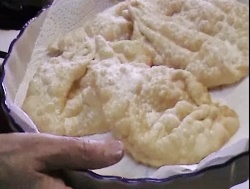
Wedan Haman, a Karaite take on “Oznei Haman.” Check out my article for more details.
About a thousand years ago, the Karaites cancelled Purim. They just skipped it altogether and with the waving of a hand they jumped a month into the future to celebrate Passover. Sounds crazy. But it’s true. You can read about this and more in my article Comparing Purims, in which I identify some interesting similarities and differences between the Rabbinic and Karaite conceptions of Purim.
Below, you can check out some more Purim shenanigans that I did *not* put into the article.
First, let me express my sincere thanks to folks at TheTorah.com for inviting me to write another piece for them. My first piece was A Shofar-less “Rosh Hashanah”: A Karaite’s Experience of Yom Teru’ah. And I’d also like to thank them for editing the work to make it look like I’m way smarter than I am. And finally, Tomer Mangoubi, author of Mikdash Me’at, deserves my gratitude for continuously making classical Karaite thought available to the masses.
As promised, some things that did not make the article:
- A Purim Effigy: In my article at TheTorah.com and on this site previously, I discuss how the Karaites light candles on Purim. Did the Karaites take it too far one year? In the year 1030, some Rabbanites spread a rumor that the Karaites burnt “three Rabbanite figures in effigy on Purim.” This sounds strange today, but it was actually a long-standing Rabbinic tradition to burn effigies of their adversaries on Purim. The Rabbanite leader at the time looked into the matter, and determined (with the assistance of other Rabbanites) that the rumor of the effigy was pure libel- and the Karaites had done no such thing. Strife ensued within the Rabbinic community, with some Rabbanites seeking a ban on the perpetrators of the rumor. The affair ended with the Rabbinic masses having “finally been convinced of . . . avoiding confrontation” with the Karaites. [1.]
- A Subversive Purim Celebration: My article at TheTorah.com discusses how the Karaites and Rabbanites celebrated Purim together in Egypt in the mid-1900s. Those celebrations took place for the love of the holiday; but in the year 1039, Karaites and Rabbanites celebrated Purim together in Ramla, which some tried to leverage as a power play. In short, the Rabbanites were in the midst of a leadership struggle, and one of the Rabbinic leaders wanted to show that he was able to unite Rabbanites and Karaites (even if only to assert dominion over them all). This Rabbanite leader held a public reading of the Book of Esther at his synagogue, about which he would later boast in letters to distant Karaites that “not a single Rabbanite or [K]araite” missed the Purim celebration. As Dr. Rustow points out, “[E]ven correcting for self-serving exaggeration, the vision is arresting: the man claiming the highest rabbinic office . . . is at pains to emphasize the presence of [K]araites in his house of worship.” [2.]
I wish we’d return to the days where Karaites were numerous enough that prominent Rabbanites would engage in “self-serving exaggeration” about their relationship with us. Maybe one day.
In any event, check out my article at TheTorah.com, and let me know what you think.
* * *
[1.] Heresy and the Politics of Community, Rustow, pp. 224-226.
[2.] Heresy and the Politics of Community, Rustow, pp. 307-310.


Thank you for keeping us unreconstructed Rabbanite Jews informed in an unfailingly friendly, fraternal manner. !חג פורים שמח
My pleasure, and Purim Sameach!
it is somewhat baffling to me that we celebrate Purim (which is a good thing) and not celebrate Hanukah. Both holidays are based on historical events, even though not mandatory, and bring joy to us all. In Purim we celebrate Mordocai and Esther’s victory over Haman as for Hanukah, we celebrate the victory of the Maccabi’s regaining our Temple. The thought was, at least to my understanding (during my life in Egypt) is that the Temple was destroyed or at least was not in our possession. Now though, we have regained the Temple wall with Israel ‘s victory over the Arabs during the 1967 war.
Please when possible, would you shed some thoughts on this subject.
Thanks Shawn.
Shalom! Great article! I was wondering if there is an English translation for the Wedan Haman, of the ingredients and their amounts as I’d love to try making this. I did understand how they are made from the video! Thanks!
We are working on this! And we hope to do a Karaite fact card on it.
Pingback: Rabbi Jack Abramowitz of 'Jew in the City' is Welcome in My Tent - A Blue Thread